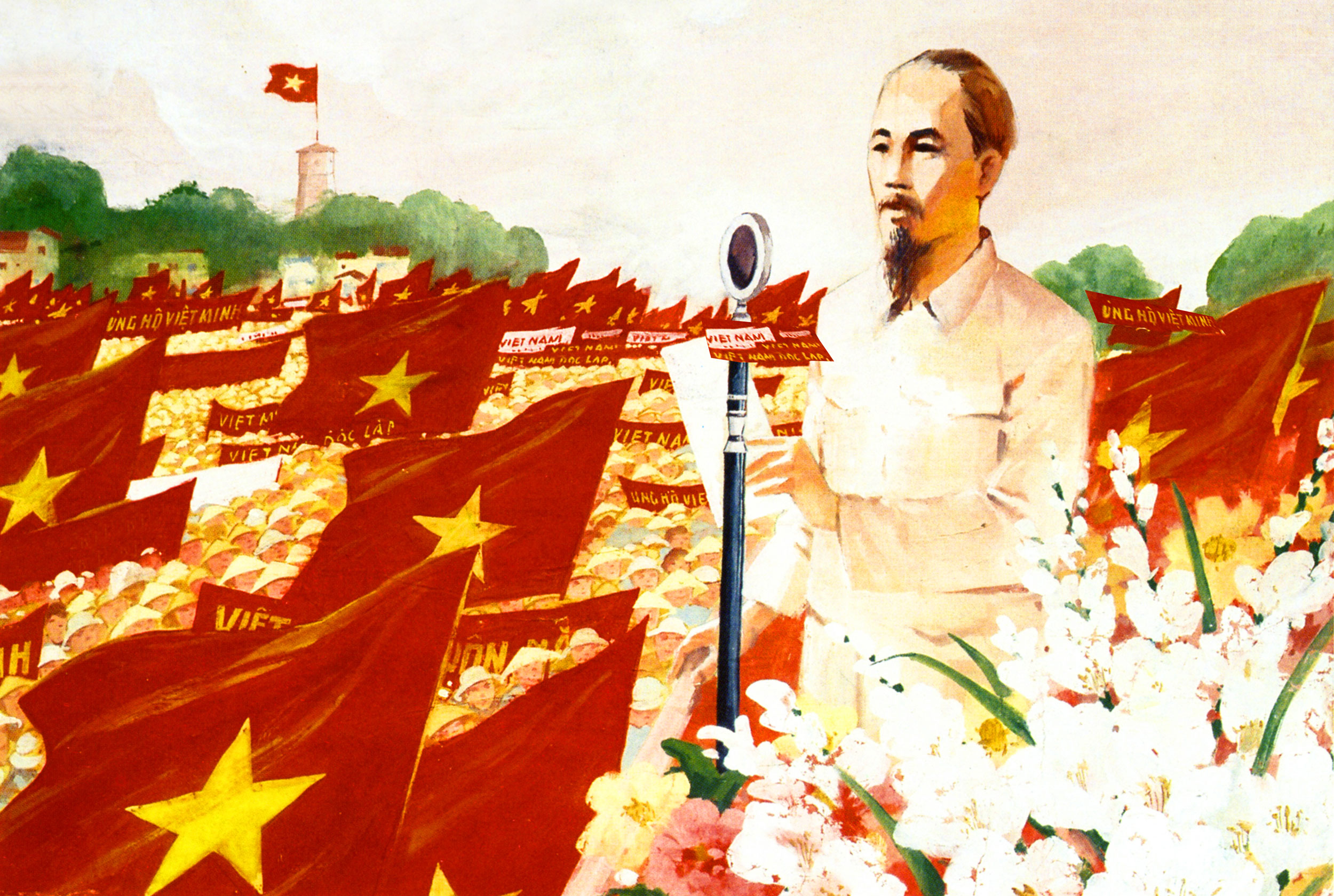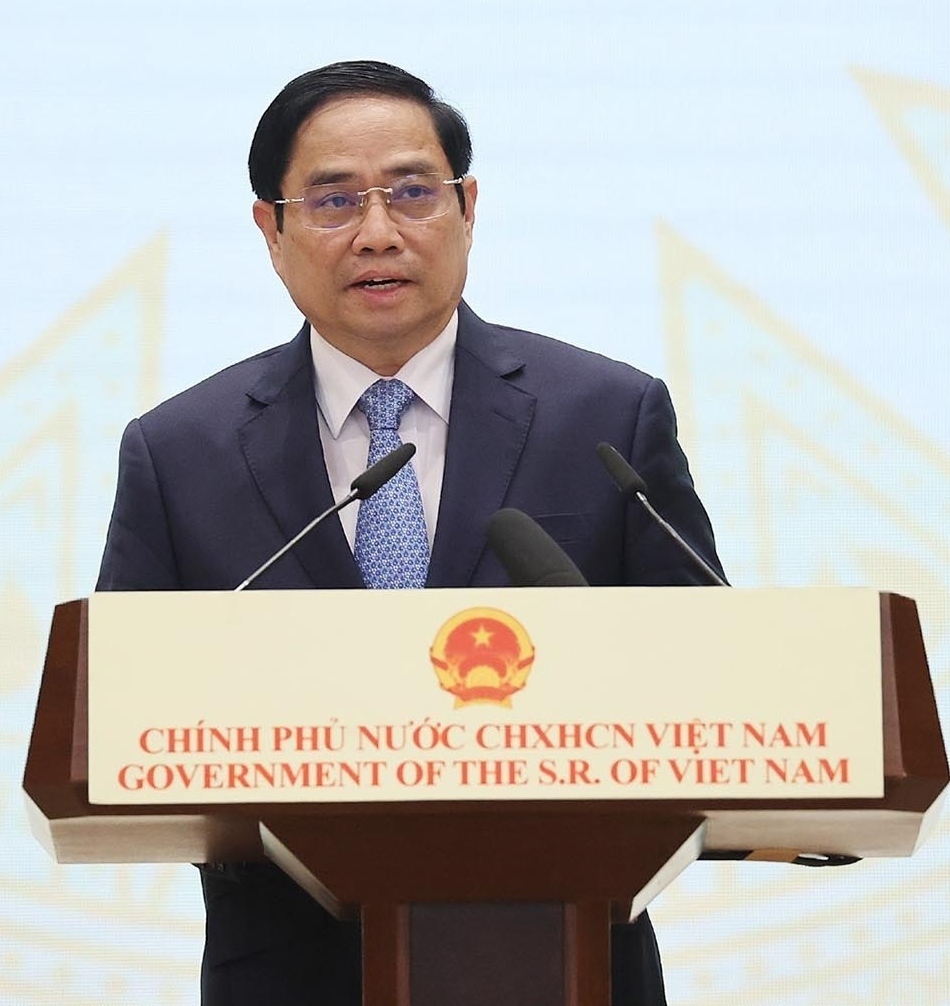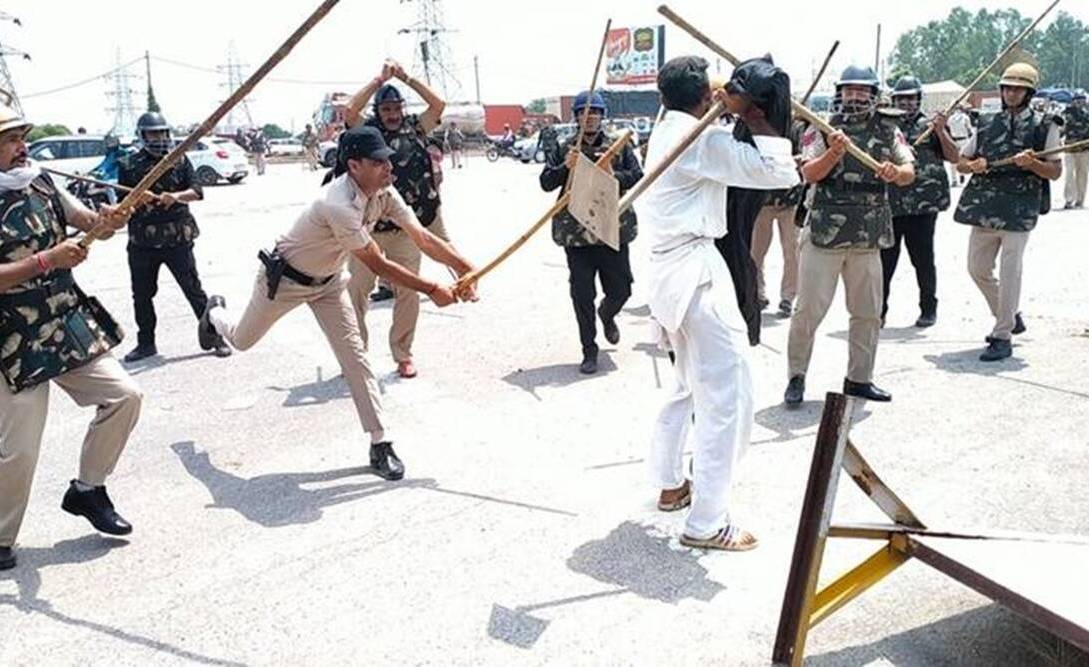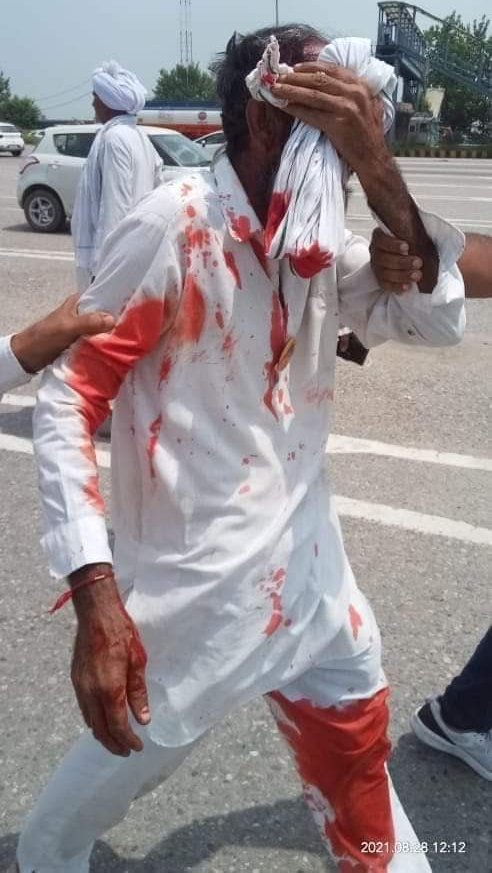
| No. 9 | September 5, 2021 |
|
CONTENTS • The Losses We Mourn and the Challenges We Accept • Frustrated U.S. Spirit of Revenge More Deadly Than Ever
• Another Empire Bites the Dust • Humiliation of the "World's Most Powerful Military" - Kathleen Chandler - • Get
Canada Out of the U.S. War Machine and - Margaret Villamizar - • Biden's Attempts to Use Threats to Overcome U.S. Humiliation • The People of Afghanistan Played Decisive Role in U.S. Defeat • Massive
U.S. Spending Fuels Corruption and
• Living in a Period of Darkest Reaction
• 76 Years of National Independence
• Stand with the Korean People to Achieve
Peace
• State Violence Will Not Save India - J. Singh -
Devastating August 14 Earthquake in Haiti • All Out to Support the Haitian People's Struggle to Recover • We Must Support Local Organizations in Haiti - Solidarité Québec-Haiti - • On the Situation Facing the Heroic Haitian People - Interview, Frantz André, Solidarité Québec-Haiti - 20 Years After 9/11 Tragedy The Losses We Mourn and the |
|
He referred to the drone strike said to be against ISIS-K, but which killed many civilians, including at least six children. Canada remains silent as always and itself pledges support for the commission of such crimes.
With typical U.S. imperialist arrogance Biden went on:
"As Commander-in-Chief, I firmly believe the best path to guard our safety and our security lies in the tough, unforgiving, targeted precise strategy that goes after terror where it is today, not where it was two decades ago."
Despite this, he spoke just like Bush did 20 years ago:
"For anyone who gets the wrong idea, let me say clearly. To those who wish America harm, to those that engage in terrorism against us or our allies, know this: The United States will never rest. We will not forgive. We will not forget. We will hunt you down to the ends of the Earth and you will pay the ultimate price."
Chairman of the Joint Chiefs of Staff General Mark Milley echoed Biden's remarks saying:
"It is now our mission to ensure that we continue our intelligence efforts, continue our counterterrorism efforts, continue our military efforts to protect the American people for the next 20 years."
Secretary of Defense Lloyd Austin added:
"It's our duty to defend this nation, and we're not going to take our eye off the ball. And that means relentless counterterrorism efforts against any threat to the American people from any place."
Such efforts to restore U.S. credibility aim to unite the military bureaucracy behind this warmongering direction which is essentially the one declared by Bush and Donald Rumsfeld who thought shock and awe would bring the people of Iraq to welcome the U.S. “liberators” with open arms. It did not happen then and will not happen today either.
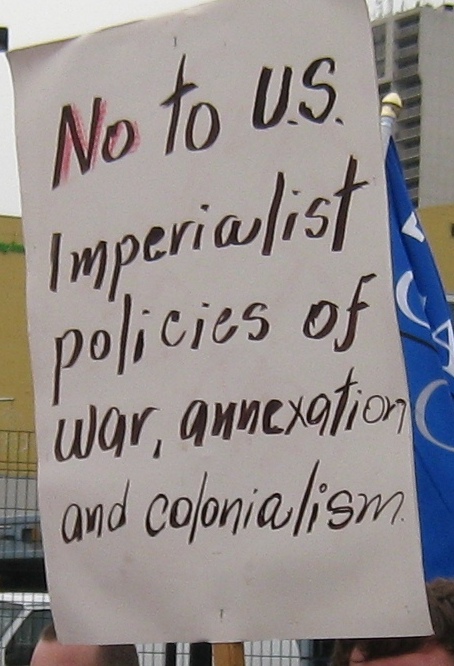
The lead diplomat of the European Union Josep Borrell said the defeat was "a failure of the Western world and it's a game changer for international relations."
Canada then contracted Ukrainian special forces trained by Canada to carry out the evacuation of Afghans in the service of Canada and the Globe and Mail during the occupation. The Trudeau government has pledged to settle 20,000 Afghans in Canada. The U.S. Secretary of Homeland Security has said that at least 50,000 Afghan refugees will be admitted into the U.S. Overall, some 300,000 Afghans have been involved in the U.S. military operations, and are now said to be at risk for reprisal.
Since assuming the presidency Biden has tried to contend with the U.S. loss of prestige and credibility, both within the U.S., among its allies and amongst the peoples of the world. His bravado "America is back" rings hollow so long as the U.S. cannot get people to accept its authority. Its use of force and threats to use more force are nonetheless very real. Anyone who does not bend their will to the will of U.S. imperialist power faces destruction, sanctions, and use of force. As Biden put it, the U.S. will "hunt you down" and make you "pay the ultimate price."
The biggest problem the U.S. faces is its repeated failure to make predictions and thus it suffers one defeat after another. Its defeat in Afghanistan shows U.S. actions and policies remain filled with contradictions as the factions within the ruling oligarchy intensify and the peoples of the world and the U.S. itself set their own agenda to fulfill their striving for peace, freedom and democracy.
The People of Afghanistan
Played Decisive
Role in U.S. Defeat
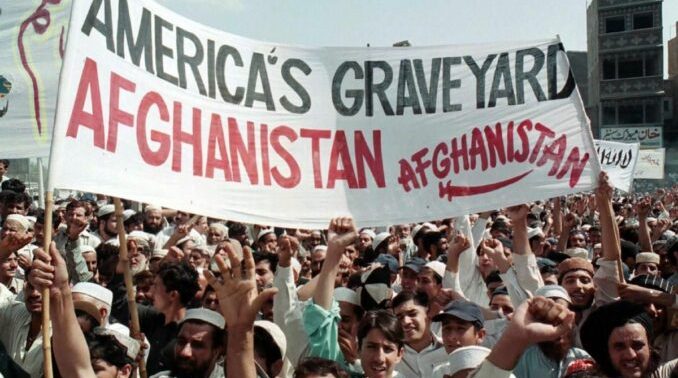
Demonstration in
Pakistan, September 2001, against U.S. invasion of Afghanistan.
The people of Afghanistan, with a long history of defeating invaders, once again secured victory in driving the U.S. out of the country. It was the people and their stand against foreign intervention that was decisive, not the power and military might of the U.S. Indeed the strength of the people of Afghanistan is such that in the last 30 years they have defeated two great powers, first the former Soviet Union and now the U.S.
The U.S. tried to hide this reality by claiming the fault was with the Afghan Army and security forces. Despite massive U.S. funding, arms and training, it is said they were "unwilling" to fight. Biden went so far as to insinuate they were cowards.
As is common, the U.S. can never predict the enthusiasm of the people in fighting for their right to decide their own affairs, free from foreign intervention. The U.S. ignores that the people of Afghanistan have their own ways of sorting out problems and of governance so as not to fight each other while consistently opposing foreign invasions. The U.S. could not believe that the people it managed to buy off and empower would flee. It did not expect the people of Afghanistan to persist for 20 years, nor did they expect that the U.S. and their collaborators would be forced to flee in such a humiliating manner.
President Biden says the U.S. must "learn from our mistakes," but it is clear it does not want to learn this basic lesson. From World War II to Korea, Vietnam, Greece, Southeast Asia, Latin America and the Caribbean to today with Afghanistan, Yemen, Syria, Korea, Iran, Cuba and Venezuela amongst others, it is the people that are decisive in winning victory, not U.S. military might. The ignorance and arrogance of U.S. imperialism is such that they think their conception that the U.S. is indispensable -- not the people -- will prevail. The more the U.S. treats the people at home and abroad as disposable, the more the people will prove them wrong.
The U.S. is notorious for its lies and disinformation about the peoples abroad, whether Iraq or Iran or Libya or Syria or Yemen, all to justify U.S. aggression. In this regard, reports about what the Taliban is or is not and what it stands for and what it is doing should be recognized for what they are -- no different than those about weapons of mass destruction in Iraq or that the people of Afghanistan merited collective punishment because of 9/11.
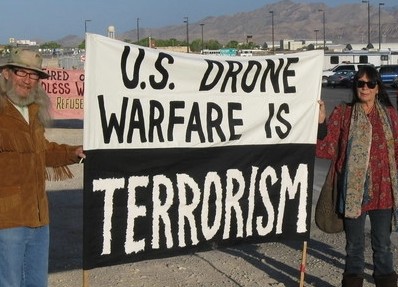 The people of
Afghanistan have a long and heroic history of standing against
invasions and have the right now to determine their own affairs without
foreign interference, including continued U.S. drone strikes. In
Biden's entire speech August 31 he never once addressed the people of
Afghanistan, made no apology for U.S. crimes, and offered no
recognition of their victory. Instead, after threatening all those who
he will decide "wish America harm" with elimination, he said the U.S.
will "continue to support the Afghan people through diplomacy,
international influence and humanitarian aid."
The people of
Afghanistan have a long and heroic history of standing against
invasions and have the right now to determine their own affairs without
foreign interference, including continued U.S. drone strikes. In
Biden's entire speech August 31 he never once addressed the people of
Afghanistan, made no apology for U.S. crimes, and offered no
recognition of their victory. Instead, after threatening all those who
he will decide "wish America harm" with elimination, he said the U.S.
will "continue to support the Afghan people through diplomacy,
international influence and humanitarian aid."
While claiming the U.S. will support the Afghan people, Biden has frozen nearly all of the Afghan Central Bank's $9.4 billion in foreign currency reserves, depriving the new government and people of Afghanistan of funds needed for food and basic services. Biden also got the International Monetary Fund not to release $450 million in funds that were scheduled to be sent to Afghanistan to deal with the coronavirus pandemic. The U.S. and other Western countries have also halted humanitarian aid to Afghanistan. As British Prime Minister Boris Johnson put it, withholding aid gave them "very considerable leverage -- economic, diplomatic and political."
Just as the U.S. is using sanctions against Cuba, the Democratic People's Republic of Korea, Iran, Venezuela and other countries in an effort to bring them to their knees and failing, it will no doubt fail in Afghanistan. Again, it is the people and their just fight to determine their own affairs that are decisive, not U.S. sanctions and military might.
Massive U.S. Spending Fuels Corruption and Backward Conditions in Afghanistan
The anti-war organization Code Pink points out: "The United States spent $2.26 trillion on its war in Afghanistan. Spending that kind of money in any country should have lifted most people out of poverty. But the vast bulk of those funds, about $1.5 trillion, went to absurd, stratospheric military spending to maintain the U.S. military occupation, drop over 80,000 bombs and missiles on Afghans, pay private contractors, and transport troops, weapons and military equipment back and forth around the world for 20 years."
| |
The following excerpt from Code Pink addresses the massive U.S. spending and corruption it generated in Afghanistan.[1]
"Since the United States fought this war with borrowed money, it has also cost half a trillion dollars in interest payments alone, which will continue far into the future. Medical and disability costs for U.S. soldiers wounded in Afghanistan already amount to over $175 billion, and they will likewise keep mounting as the soldiers age. Medical and disability costs for the U.S. wars in Iraq and Afghanistan could eventually top a trillion dollars.
"So what about 'rebuilding Afghanistan'? Congress appropriated $144 billion for reconstruction in Afghanistan since 2001, but $88 billion of that was spent to recruit, arm, train and pay the Afghan 'security forces' that have now disintegrated, with soldiers returning to their villages or joining the Taliban. Another $15.5 billion spent between 2008 and 2017 was documented as 'waste, fraud and abuse' by the U.S. Special Inspector General for Afghanistan Reconstruction.
"The crumbs left over, less than two per cent of total U.S. spending on Afghanistan, amount to about $40 billion, which should have provided some benefit to the Afghan people in economic development, health care, education, infrastructure and humanitarian aid.
"But, as in Iraq, the government the U.S. installed in Afghanistan was notoriously corrupt, and its corruption only became more entrenched and systemic over time. Transparency International (TI) has consistently ranked U.S.-occupied Afghanistan as among the most corrupt countries in the world.
"Western readers may think that this corruption is a long-standing problem in Afghanistan, as opposed to a particular feature of the U.S. occupation, but this is not the case. TI notes that 'it is widely recognized that the scale of corruption in the post-2001 period has increased over previous levels.' A 2009 report by the Organization for Economic Cooperation and Development warned that 'corruption has soared to levels not seen in previous administrations.'
"Those administrations would include the Taliban government that U.S. invasion forces removed from power in 2001, and the Soviet-allied socialist governments that were overthrown by the U.S.-deployed precursors of Al Qaeda and the Taliban in the 1980s, destroying the substantial progress they had made in education, health care and women's rights.
"A 2010 report by former Reagan Pentagon official Anthony H. Cordesman, entitled How America Corrupted Afghanistan, chastised the U.S. government for throwing gobs of money into that country with virtually no accountability.
"The New York Times reported in 2013 that every month for a decade, the CIA had been dropping off suitcases, backpacks and even plastic shopping bags stuffed with U.S. dollars for the Afghan president to bribe warlords and politicians.
"Corruption also undermined the very areas that Western politicians now hold up as the successes of the occupation, like education and health care. The education system has been riddled with schools, teachers, and students that exist only on paper. Afghan pharmacies are stocked with fake, expired or low quality medicines, many smuggled in from neighbouring Pakistan. At the personal level, corruption was fueled by civil servants like teachers earning only one-tenth the salaries of better-connected Afghans working for foreign NGOs and contractors.
"Rooting out corruption and improving Afghan lives has always been secondary to the primary U.S. goal of fighting the Taliban and maintaining or extending its puppet government's control. As TI reported, 'The U.S. has intentionally paid different armed groups and Afghan civil servants to ensure cooperation and/or information, and cooperated with governors regardless of how corrupt they were ... Corruption has undermined the U.S. mission in Afghanistan by fuelling grievances against the Afghan government and channeling material support to the insurgency.'
"The endless violence of the U.S. occupation and the corruption of the U.S.-backed government boosted popular support for the Taliban, especially in rural areas where three-quarters of Afghans live. The intractable poverty of occupied Afghanistan also contributed to the Taliban victory, as people naturally questioned how their occupation by wealthy countries like the United States and its Western allies could leave them in such abject poverty.
"Well before the current crisis, the number of Afghans reporting that they were struggling to live on their current income increased from 60 per cent in 2008 to 90 per cent by 2018. A 2018 Gallup poll found the lowest levels of self-reported 'well-being' that Gallup has ever recorded anywhere in the world. Afghans not only reported record levels of misery but also unprecedented hopelessness about their future.
"Despite some gains in education for girls, only a third of Afghan girls attended primary school in 2019 and only 37 per cent of adolescent Afghan girls were literate. One reason that so few children go to school in Afghanistan is that more than two million children between the ages of six and 14 have to work to support their poverty-stricken families.
"Yet instead of atoning for our role in keeping most Afghans mired in poverty, Western leaders are now cutting off desperately needed economic and humanitarian aid that was funding three-quarters of Afghanistan's public sector and made up 40 per cent of its total GDP.
"In effect, the United States and its allies are responding to losing the war by threatening the Taliban and the people of Afghanistan with a second, economic war. If the new Afghan government does not give in to their 'leverage' and meet their demands, our leaders will starve their people and then blame the Taliban for the ensuing famine and humanitarian crisis, just as they demonize and blame other victims of U.S. economic warfare, from Cuba to Iran. [...]"
Note
1. "Afghan Crisis Must End America's Empire of War, Corruption and Poverty," Medea Benjamin and Nicoles Davies, codepink.org, August 30, 2021.
United States
Living in a Period of Darkest Reaction
The U.S. Supreme Court has stayed the 60-day moratorium on evictions due to COVID-19 announced by the Centers for Disease Control and Prevention on August 3. Millions of tenants and and homeowners with mortgages, who are behind in their payments, are facing evictions. In many cities across the country protests and demonstrations have been going on against ruthless evictions by the real estate sharks and banks for missed rent and mortgage payments because people have lost their jobs due to COVID. The " richest" country in the world is being drained and looted by a handful of financial oligarchs.
 The U.S. Supreme
Court also ruled that the Texas law banning abortion can come into
effect while legal challenges continue. This setback for women's rights
is yet another proof, along with laws depriving various sections of the
people of their voting rights and continued killings by police and
other state violence, that we are living in a period of darkest
reaction.
The U.S. Supreme
Court also ruled that the Texas law banning abortion can come into
effect while legal challenges continue. This setback for women's rights
is yet another proof, along with laws depriving various sections of the
people of their voting rights and continued killings by police and
other state violence, that we are living in a period of darkest
reaction.
Our hearts also go out to the people of Louisiana who have been hit hard by Hurricane Ida when the effects of Hurricane Katrina in 2005 are not yet overcome and its memory is still fresh in people's minds. Pictures of massive floods, impassible streets and mass evacuation, bring back memories of the abandonment of the people during Katrina. More than a million people are out of power and expected to remain so for weeks. A UN report released recently points out that "Disastrous Weather" has increased fourfold since the 1970s due to the climate crisis.
It is thanks to the people speaking in their own name and expressing social solidarity that all those left to fend for themselves find relief. All of it underscores that the peoples are the decisive factor in bringing about change that turns things around in their favour.
Hail Vietnam National Day!
76 Years of National Independence
Uncle Ho reading the Declaration of Independence, by Nguyen Nguyen Duong (1979), colour powder. (Courtesy Vietnam National Fine Arts Museum)
Seventy-six years ago the historic August Revolution of the Vietnamese people was successfully concluded and Vietnam emerged a sovereign independent country putting an end to a 1,000-year history of Chinese rule and close to 100 years of French colonial oppression and Japanese fascist occupation. On September 2, 1945, President Ho Chi Minh issued Vietnam's Declaration of Independence in Ba Dinh Square, Hanoi.
Before a jubilant assembly of close to 1 million of his compatriots, Ho Chi Minh declared, "We, members of the Provisional Government of the Democratic Republic of Vietnam, solemnly declare to the world that Vietnam has the right to be a free and independent country -- and in fact is so already. The entire Vietnamese people are determined to mobilize all their physical and mental strength, to sacrifice their lives and property in order to safeguard their independence and liberty."
Vietnam's National
Day has since become a joyous occasion for the Vietnamese people at
home and abroad to review their successes and show their pride in the
heroic and indomitable tradition of the nation under the leadership of
the Communist Party of Vietnam. National Day is celebrated with great
warmth and affection by close to 100 million Vietnamese in their
homeland, by the patriotic diaspora and by friends of Vietnam worldwide.
General Secretary of the Communist Party of Vietnam Nguyen Phu Trong pays tribute to Ho Chi Minh on National Day (left). Prime Minister Pham Minh Chinh delivers a speech at the virtual celebration of National Day (right).
On this occasion, the Communist Party of Canada (Marxist-Leninist) extends its warmest revolutionary greetings to the Communist Party of Vietnam, the government of the Socialist Republic of Vietnam and the Vietnamese people everywhere.
Speaking on September 2 at a virtual celebration of Vietnam's 76th National Day, Prime Minister Pham Minh Chinh said that over the past 76 years, the Party, State and people of Vietnam, have tirelessly strived to defend independence, sovereignty, unity, territorial integrity, national self-determination, and the freedom and happiness for the people, in the spirit of "nothing is more precious than independence and freedom."
He said that after 35 years of Doi Moi (renewal), of opening and integration and overcoming countless challenges and hardship, and with thanks also to the invaluable and effective assistance of its international friends, Vietnam has achieved immense and historic triumphs in every area. The size and power of Vietnam's economy are soaring. From a poor, less developed country, Vietnam has become a middle-income developing country. The United Nations recognized Vietnam as one of the leading countries in realizing the Millennium Development Goals, especially on poverty reduction, gender equality, health care and education. "Most importantly," he said, "we identify human beings as the centre, the subject, the highest goal and the most important driver of development."
Prime Minister Pham Minh Chinh expressed Vietnam's appreciation "to other countries and international organizations for their keen attention and enabling conditions given to the overseas Vietnamese nationals and community in your countries." He also appealed to the international community for continued assistance and sharing of technology, experience, financing, medical supplies, equipment and bio-products, treatment drugs and especially vaccines. "The best vaccine," he said, "is the earliest given."
Vietnam, he said, would continue its efforts to safeguard the interest of the nation-state on the basis of the fundamental principles of the UN Charter and international law.
The Socialist Republic of Vietnam stands strong and tall in the community of nations as a champion of peace, freedom, sovereignty and independence. In a world dominated by big powers Vietnam finds its way to secure the well-being and to uphold the most cherished principles of the people. Vietnam's successes underscore the necessity for the people to be in charge of their own destiny and to put all the human and material assets of their society at the disposal of providing solutions that favour the well-being of the people.
Long Live the Socialist Republic of Vietnam!
(Photos: Dan Cong San)
73rd Anniversary of Founding of Democratic People's Republic of Korea
Stand with the Korean People to Achieve Peace
and
National Reunification
Celebration in 2018 marks the 70th anniversary of the founding of the Democratic People's Republic of Korea. (Xinhua)
September 9 marks the 73rd anniversary of the founding of the Democratic People's Republic of Korea (DPRK). The Communist Party of Canada (Marxist-Leninist) sends its greetings to Kim Jong Un, Chairman of the Workers' Party of Korea, to the Workers' Party of Korea, and to the government and the people of the DPRK on this joyous occasion. CPC(M-L) wishes the DPRK every success in its work to secure peace and prosperity for their nation and to put an end to more than 70 years of U.S.-engineered division, tension and strife on the Korean Peninsula.
The Korean people, under the leadership of General Kim Il Sung and the Korean People's Army, liberated their nation on August 15, 1945 after decades of struggle against the Japanese occupiers (1910-1945). From the ruins of war they began building a modern democratic state. Throughout the country, People's Committees were formed and in August to September 1945 the Korean people elected their representatives to a People's Assembly, which proclaimed the "Korean People's Republic" on September 6, 1945.
However, the Republic was short-lived. Even though the Korean people freed themselves from the Japanese occupiers without the presence of any U.S. troops, the U.S. included a term in the surrender signed by Japan on September 2, 1945 that the Korean Peninsula would be divided along the 38th parallel and that the defeated Japanese military in Korea would surrender to U.S. forces in the south, not to the Korean liberators. On September 8, 1945, two days after the declaration of the Republic, thousands of U.S. troops began to arrive in Korea. The new occupiers declared the Korean People's Republic illegal and began to crush the People's Committees by force. In the words of U.S. General Douglas MacArthur, Korea was to be an "anti-communist bulwark."
Over the next three bloody years, through a campaign of mass terror and brutality, the illegal U.S. Military Government and their local agents criminalized, rounded up, tortured, imprisoned and murdered hundreds of thousands of suspected communists, "leftists" and other patriots who refused to submit to U.S. dictate.
The U.S. organized a fraudulent "free and fair" election in May 1948, which was boycotted en masse by the Korean people. The U.S. installed Syngman Rhee as President of the Republic of Korea by force of arms in July 1948.
In response to this crime by the U.S. against the Korean people and their drive for independence and reunification, Kim Il Sung declared the founding of the DPRK on September 9, 1948 in Pyongyang at a jubilant rally of more than 1 million people. The founding of the DPRK guaranteed the Korean people the revolutionary base from which their drive for reunification and self-determination would continue.
The U.S. puppet anti-communist Syngman Rhee regime clung to power through terror and brutality. It suffered irreversible losses in the south Korean election of May 1950. The U.S. then launched the Korean war to capture the Korean Peninsula and use it to threaten aggression against China and the Soviet Union. More than 4 million Korean civilians were killed and massive destruction caused to the economy and infrastructure. The United States and 17 other countries, including Canada, took part in this war of aggression against the Korean nation under the fig-leaf of the UN flag on the false pretext of collective self-defence against an attack by the north on the south.
The U.S. aggressors committed crimes against the peace, crimes against humanity and untold war crimes, including massacres of civilians, as well as the use of biological and chemical weapons and the fire-bombing of various northern cities, which resulted in many civilian casualties. The DPRK, though still in its infancy, with the help of the Chinese Volunteer Forces, organized the Korean people and defeated the U.S. in the war and forced it to sign the Korean Armistice Agreement, thus defending the sovereignty and honour of the Korean nation.
Kim Il Sung, President of the DPRK, said at the time: "The victory of our people in the Korean War was a victory of the revolutionary people over the imperialist forces, a victory of the revolutionary army over the aggressive forces of imperialism. It proved that the people who rise up for freedom, independence and progress, taking their destiny into their own hands under the leadership of a Marxist-Leninist party, will never be conquered by any imperialist forces of aggression. It also exposed the vulnerability and corruptness of U.S. imperialism, demonstrating to the oppressed nations of the world that U.S. imperialism is by no means an unconquerable enemy and that they too can definitely fight and defeat it."
It is important to point out that the DPRK has committed no act of aggression against another country. The Korean War, which engulfed the entire Korean Peninsula, was provoked by the U.S. and its puppet regime in the south. Standing firm against the might of the U.S. military empire -- known for its use of nuclear, chemical and biological weapons worldwide -- the DPRK affirms not only its right to be, but the right of all nations and peoples to self-determination and peace. For this internationalist spirit, the DPRK is justly admired by all justice- and peace-loving people in Canada and the world.
Today, the DPRK stands proudly second to none in the family of nations. Despite the brutal racist and illegal sanctions that the U.S. imposed on the DPRK during the Korean War, which have increased in intensity with successive U.S. imperialist administrations, the DPRK has not been brought to its knees. It prevails and thrives despite the most arduous and trying conditions.
Under the leadership of Kim Jong Un and the Workers' Party of Korea, the entire people of the DPRK have been mobilized to strengthen their socialist independent economy, and uphold the DPRK's independence and right to be. As one, they work collectively to improve the standard of living of the people, deepen and widen its people's culture, and maintain its dignity.
The DPRK has also built its self-defence capacity to safeguard its independence from the constant military threats and nuclear blackmail of the U.S. imperialist warmongers. While the DPRK today has diplomatic and trade relations with more than 165 countries in the world, Canada, integrated into the U.S. imperialist agenda for war, has refused to even recognize the credentials of the DPRK Ambassador to Canada despite establishing formal links with the DPRK in 2001. This is unacceptable. Canadians want Canada to be a force for peace in the world and normalizing relations with the DPRK would enhance peace on the Korean Peninsula as well as contribute to peace in the world.
CPC(M-L) treasures the meeting between its founder and leader Comrade Hardial Bains and President Kim Il Sung. Canadian communists will always stand with the people of the DPRK and the Workers' Party of Korea and support their efforts to secure peace on the Korean Peninsula, justice, prosperity, and the reunification of the Korean nation by their own efforts.
On the occasion of the 73rd anniversary of the founding of the DPRK, CPC(M-L) calls on the Canadian people to stand with the people of the DPRK for their right to be. The Canadian state and its governments must abandon their hostile anti-communist policies toward the DPRK and normalize relations with that country for mutual benefit and for peace.
Brutal Assaults of Indian State Against Peaceful Farmers
State Violence Will Not Save India
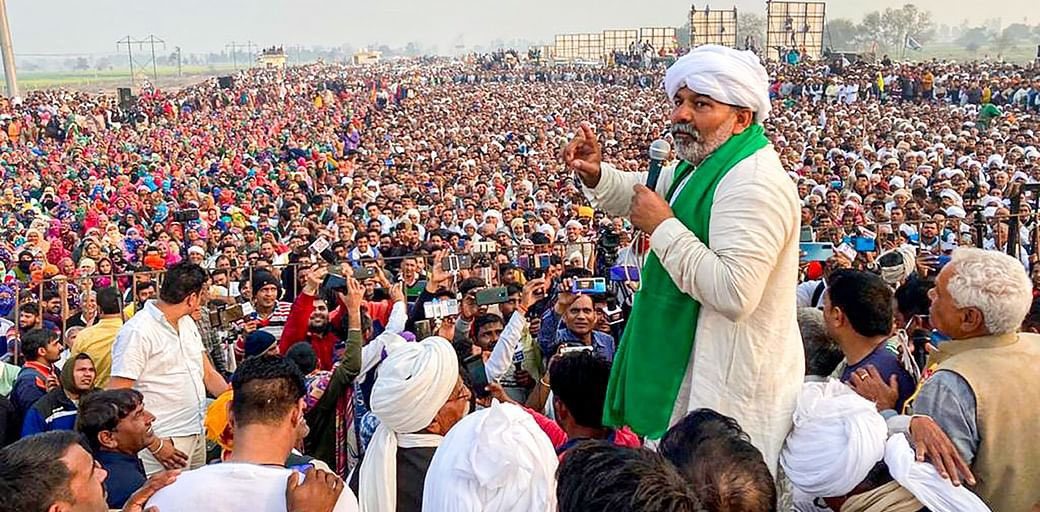
Mahapanchayat
(mass gathering) September 5, 2021 in Muzzafarnagar, Uttar
Pradesh,
held to discuss the brutal attacks on farmers by forces of the Indian
state.
Brutal attacks by the police and paramilitary forces of the Indian state on the peaceful Indian farmers have been flashing on social media. Despite images of farmers' cracked heads, broken arms and legs and a brutal death, the farmers have shown their resolve and vowed to stand firm in the fight against tyranny and state terror. With spirits soaring and the unprecedented determination of a mass movement, even as the blood drips from the wounds inflicted by the vicious police violence, the resolve of the farmers and their supporters all over India and the world is greater than ever.
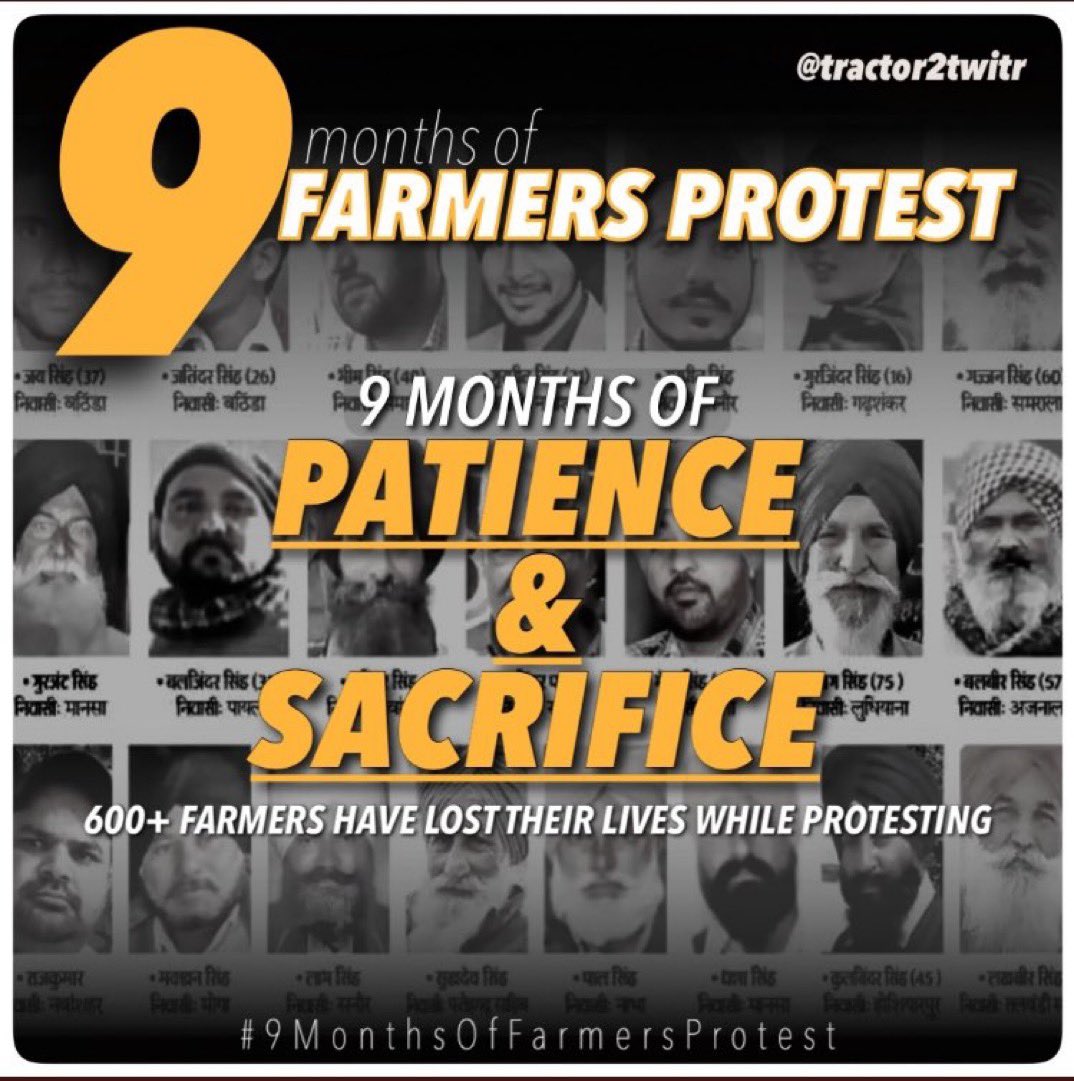 They
follow in the footsteps of many heroes of the people who sacrificed
their lives with their heads held high, never giving up their striving
for freedom or their dignity. Ya Jit Ke Jawange Ya Sadiyan
Lashan Jangiyangi, say the farmers. (Either We Will Win or
Our Dead Bodies Will Return). TML Monthly joins the
people all over the world who are saluting this spirit. We join them in
saluting the youth who threw their bodies over those of elderly farmers
to protect them as they were ruthlessly beaten by police and the
paramilitaries. Their valour will inspire folk songs and poetry for
years to come.
They
follow in the footsteps of many heroes of the people who sacrificed
their lives with their heads held high, never giving up their striving
for freedom or their dignity. Ya Jit Ke Jawange Ya Sadiyan
Lashan Jangiyangi, say the farmers. (Either We Will Win or
Our Dead Bodies Will Return). TML Monthly joins the
people all over the world who are saluting this spirit. We join them in
saluting the youth who threw their bodies over those of elderly farmers
to protect them as they were ruthlessly beaten by police and the
paramilitaries. Their valour will inspire folk songs and poetry for
years to come.
The farmers said: Shame on this government and all the representatives of the monopolies who have been telling the world that India is the "largest democracy" in the world. Far from independence from the British Raj being its "greatest achievement," the last 75 years have proven that it is not Loktantra (rule of the people) but Chhaltantra (rule of deceit and deception) and Goondatantra (rule of the goons).
A Mahapanchayat (mass gathering) is taking place on September 5 in Muzzafarnagar, Uttar Pradesh (UP) to discuss Mission UP and Uttarakhand. They are demanding that the officer in Karnal, who ordered police to break the farmers' skulls, be charged with murder. Thousands of farmers from each state in India came to attend the Mahapanchayat. It was expected to be the largest rally in the world held in recent times. The farmers warned people to expect provocations such as the ruling elite killing a top religious leader in UP, to incite communal divisions and violence. This has been the repeated modus operandi of the ruling elite since 1947 and the farmers are determined not to permit their struggle to be diverted or to permit communal bloodshed.
Farmers point out that the legislature, executive, judiciary and so-called political parties and the media are in fact mafias in the service of a handful of powerful corporations which stop at nothing to control the productive powers and resources of India and the world. The system's crisis of legitimacy and credibility has deepened and farmers are opening a new path by empowering the people.
Rallies and gatherings are being held in communities all over the world. Resolutions are being passed condemning the violence against the farmers by the police in Karnal and supporting their demands for the repeal of anti-farmer laws.
Farmers taking part in a protest against the Chief Minister of Haryana are brutally attacked by police, August 28, 2021.
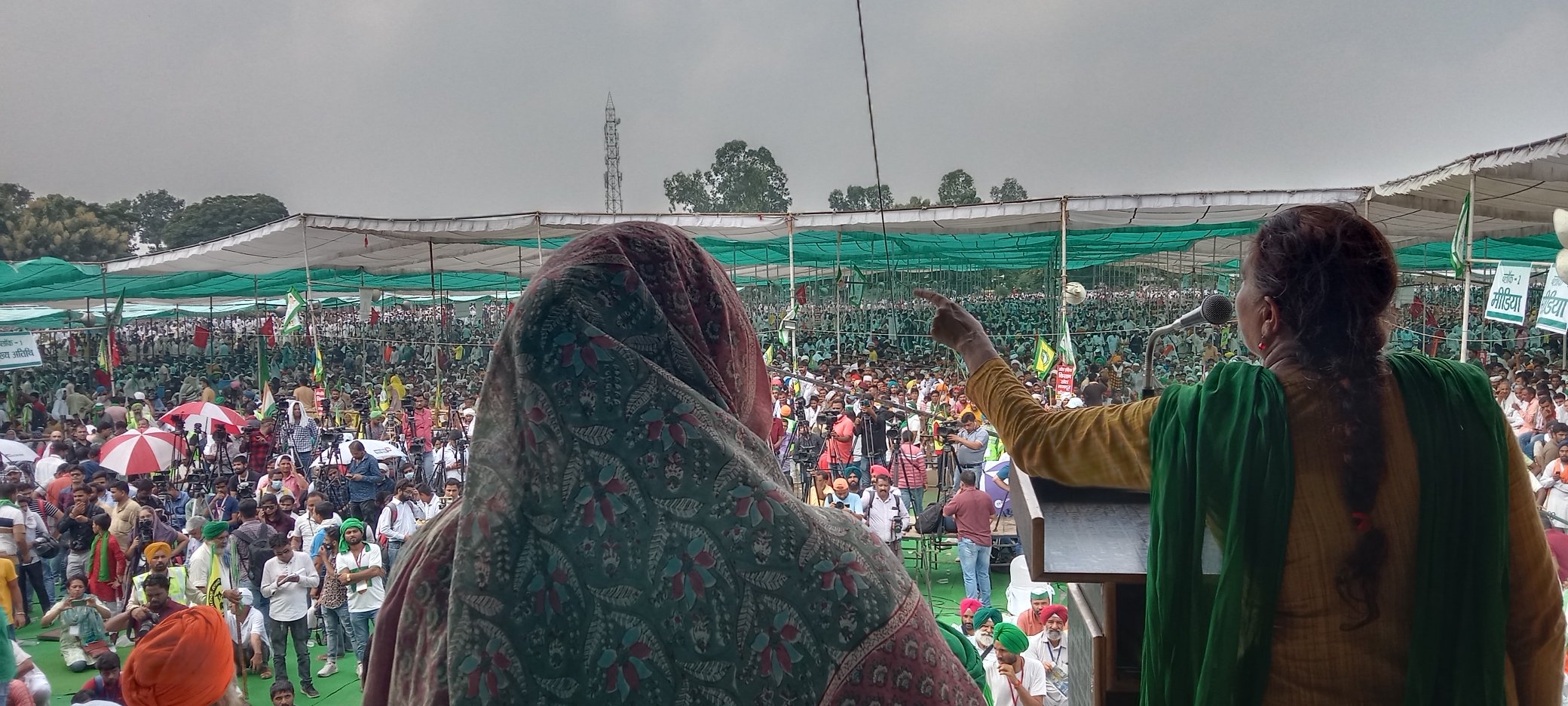
Mahapanchayat, September
5, 2021, in Muzzafarnagar, Uttar Pradesh
(Photos: Kisan Ekta Morcha, D. Bajwa)
Devastating August 14 Earthquake in Haiti
All Out to Support
the Haitian People's
Struggle to Recover
The
Haitian people are making heroic efforts to recover from the 7.2
magnitude earthquake that devastated the southwestern part of the
country on the morning of August 14. The epicentre of the quake was
about 12 km from the town of Saint-Louis du Sud and was 10 km
deep. At least two cities in the region, Les Cayes and
Jérémie, reported major devastation, with people
caught
under the rubble and collapsed buildings. The tremor was felt in the
densely-populated capital of Port-au-Prince, some 125 km away, and in
neighbouring countries.
An estimated 2,000 people
have now died
in the earthquake and more than 12,000 have been injured. An estimated
600,000 people have been directly affected by the disaster and are in
need of urgent humanitarian assistance.
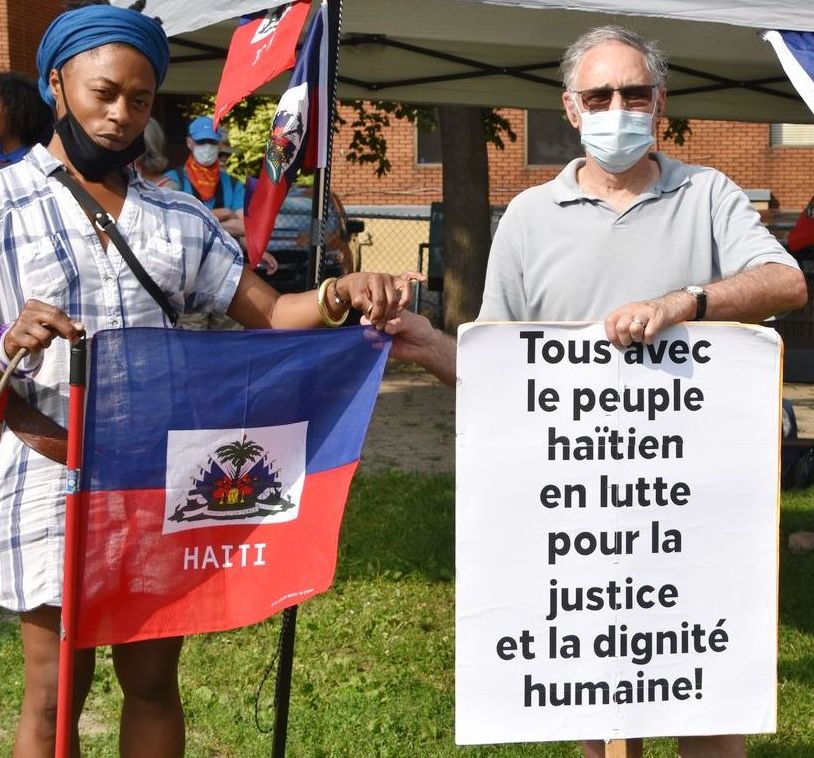 The Haitian
people's efforts to recover from the earthquake are being hampered by
the destruction carried out for decades by the Haitian oligarchy and
its imperialist masters, who have left the health care system and the
infrastructure the people require in a state of complete decay. It is
also reported that aid is being blocked and looted by armed gangs that
are linked to various elites and their political representatives, both
in Haiti and the U.S. and among the Core Group (composed of ambassadors
from Germany, Brazil, Canada, Spain, the U.S., France, the European
Union and representatives from the UN and the Organization of American
States).
The Haitian
people's efforts to recover from the earthquake are being hampered by
the destruction carried out for decades by the Haitian oligarchy and
its imperialist masters, who have left the health care system and the
infrastructure the people require in a state of complete decay. It is
also reported that aid is being blocked and looted by armed gangs that
are linked to various elites and their political representatives, both
in Haiti and the U.S. and among the Core Group (composed of ambassadors
from Germany, Brazil, Canada, Spain, the U.S., France, the European
Union and representatives from the UN and the Organization of American
States).
The Haitian people are also facing increased insecurity since the assassination of President Jovenel Moïse on July 7. In this situation, where every effort must be made to ensure the people receive relief, have their basic needs met and for the country to be rebuilt, the Core Group, in violation of the position expressed by the Haitian people's organizations, has insisted on holding presidential and legislative elections in the midst of this tragedy. The Core Group is doing so in the name of obtaining a legitimate government, which means a government that continues to do the bidding of foreign powers, with the U.S. striving to dominate, including by its military intervention. The first round of presidential and legislative elections and the constitutional referendum will take place on November 7. The second round of presidential and legislative elections will be held on January 23, 2022.
The Marxist-Leninist Party of Canada reiterates its deepest condolences to the Haitian people affected by the devastating earthquake and strongly supports their struggle for their rights and the affirmation of Haiti's right to be.
We Must Support Local Organizations in Haiti
On August 14, a powerful earthquake caused major damage in Haiti. Solidarité Québec-Haiti encourages its members and supporters to contribute to the relief efforts of the most affected communities in the departments of Sud, Grande-Anse and Nippes. It is essential to prioritize organizations that have an active presence in the communities and are led by Haitians.
 The decision to
prioritize local Haitian organizations is almost unanimous among
analysts of the situation because of the numerous fraud scandals
related to the disastrous international management of Haiti's
reconstruction funds after the January 2010 earthquake by the Interim
Haiti Recovery Commission led by Bill Clinton and Jean-Max Bellerive.
The decision to
prioritize local Haitian organizations is almost unanimous among
analysts of the situation because of the numerous fraud scandals
related to the disastrous international management of Haiti's
reconstruction funds after the January 2010 earthquake by the Interim
Haiti Recovery Commission led by Bill Clinton and Jean-Max Bellerive.
It is clear that the Haitian people remain extremely vulnerable. The foreign occupiers of Haiti led by the Core Group continue to appoint puppet governments composed of members of the reviled neo-Duvalierist regime, the Haitian Tèt Kale Party (PHTK).
As Solidarité Québec-Haiti continues to demand that Canada withdraw from the neo-colonial Core Group and allow the Haitian people to choose their leaders in peace and sovereignty, we encourage the people of Quebec and Canada to step up their solidarity and support for our brothers and sisters in Haiti.
In order to facilitate your financial contribution, we are providing a non-exhaustive list of local Haitian organizations with which our members have had recent positive experience.
Ayiti Ini
Canada: Interac transfer ayitiini@gmail.com Password: Haiti
United States: Cash app $LafontantC
Venmo-@Christine-Lafontant
Zelle-christinelafontant@hotmail.com
Person in charge: Marita
Mariasine (ayitiini@gmail.com)
Julia & Jade Foundation
Person in charge: Gabrielle Paul (georgesgpaul@gmail.com)
Konbit Pou Potapiman
(KPP)
Person in charge: Frantz Jean (konbitkpp@gmail.com)
Konbit Resistance
Person in charge: Samia Salomon (samsalomon27@gmail.com)
Oganizasyon pour
Byennèt Kaprouj
Person in
charge: Nadine Dominique (ti_landeng@yahoo.com)
Solidarité avec
St-Louis-du-Sud
Person in charge:
Fritzna Blaise Malebranche (bfritzna@gmail.com)
To contact Solidarité
Québec-Haiti:
Phone: Frantz
André, 514-898-5465
Facebook and Twitter:
Solidarité Québec-Haiti
Email:
solidaritekebakayiti@gmail.com
(August 20, 2021. Translated from original French by TML.)
On the Situation Facing the Heroic Haitian People
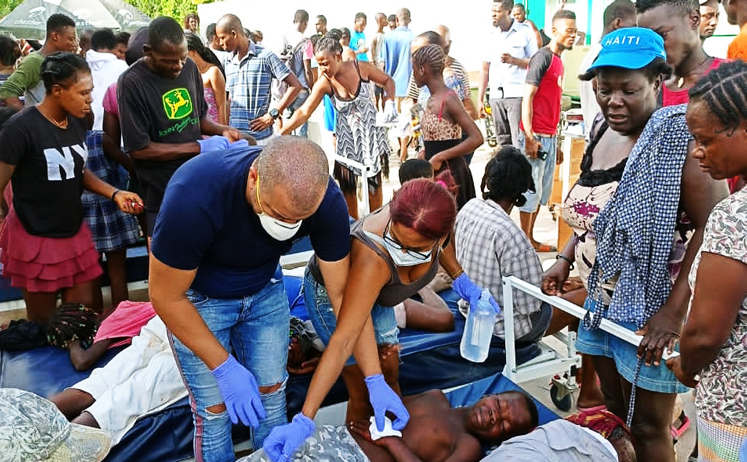
Cuban medical team
provides assistance in Corail, Haiti August 24,
2021, following the earthquake.
The Marxist-Leninist: Frantz, our deepest condolences to the Haitian people for the terrible loss of life, injuries and material devastation caused by the August 14 earthquake.
Frantz André: Thank you very much, from all of us.
TML: How do you assess the situation that the Haitian people are facing in the wake of the earthquake and the recent political developments?
FA: The recent assassination of Jovenel Moïse was already a political earthquake for Haitians. There have been what we could call seismic aftershocks, including the prime minister basically assuming the functions of president even though theoretically, on the day of Jovenel Moïse's assassination, he was no longer prime minister. We already had a dysfunctional government. We already had problems of insecurity that were far from improving.
The assassination was also like a social earthquake. Once again Haitians were like hostages when we saw that the person in the country who should have been the best protected, the president, could be assassinated in this way. This amplified the political earthquake and the seismic aftershocks. Insecurity increased. The dysfunction of the state increased. Even with all the expectations and the promises that were made that authorities would quickly find out who was behind the assassination, Haitians got the message loud and clear that nothing has changed and that the corruption and insecurity for the people remain. This is despite the fact that opposition and civil society groups came together in a coalition based on a consensus that there should not be elections in such circumstances and that there needed to be a period to prepare elections that would be honest, democratic and legitimate.
And then the earthquake of August 14 happened.
In our opinion, this is one more reason why there should not be elections at this time. The fact that the Core Group is insisting on holding elections now, elections which are scheduled for November, shows its lack of good will. It shows its insensitivity to the suffering of Haitians.
What happened on August 14 could not have happened at a worse time. We know that Haiti is sitting on different seismic faults that move regularly and this is not the first time that Haiti has been hit by an earthquake. There have been several. Port-au-Prince was destroyed twice before independence. We knew that we might eventually relive the earthquake of 2010 but it is even worse in these conditions, conditions of total chaos and with violent gangs operating in the country.
It is hard to imagine how Haitians can cope with these natural disasters, on top of the disasters imposed by imperialism and neo-colonialism. The situation now is fueled by insecurity that forces us to consider the possibility of another U.S. or UN occupation. Already, a few days after the earthquake, 7,000 U.S. Marines were dispatched to the country.
Our pain is very great. I myself have relatives in Jérémie. The cities which were the most affected by the earthquake are Jérémie and Les Cayes, and I have relatives in this region. There are more than 2,000 dead and more than 12,000 injured in this region where the hospitals, in many cases, cannot treat them. The hospitals don't have enough health care personnel, including doctors. People are being brought to hospitals but that does not mean they will be treated. Fortunately we have Cuban doctors present who offer voluntary services to the population.
In this situation, the question that arises is whether the same mistakes will be made as were made in 2010, when, following the earthquake, the millions if not billions of dollars that were donated for reconstruction were squandered, mainly by NGOs (Non-Governmental Organizations), including the Red Cross. Haiti became the NGO capital of the world. Every NGO imaginable came and collected millions of dollars for reconstruction. Our hope is that this will not be repeated.
The Red Cross is the organization that the Canadian government and a crisis committee formed in Montreal are supporting as the first responder in the emergency, along with Doctors of the World and Doctors Without Borders.
In the early days of the earthquake, countries including Cuba, Venezuela and the Dominican Republic came to Haiti's aid. They sent basic supplies, tents, sleeping bags and other items. We have not really seen that the Haitian government, the Haitian state, has a clear plan for managing this crisis. The state is not properly managing the distribution of products. There must be an equal and direct distribution to Haitians. This problem is a feature of the dysfunction of the state. There should be centralization of the management of the crisis, both in terms of receiving the aid that is sent to Haiti, whether it is money or goods, and in terms of its distribution. What I hear from people on the ground is that they do not feel that there is coordination, a plan for managing the crisis by the Haitian state.
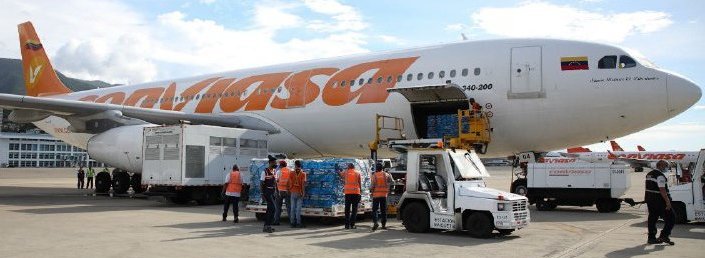
Venezuela sends aid to
Haiti, August 15, 2021, following the earthquake.
This is a direct consequence of what has happened since the assassination of Jovenel Moïse on July 7, but the problem existed long before that. I would say that at least since 2010, following the earthquake, the Haitian state has never really put in place a plan or an earthquake recovery program to ensure that there is not a repetition of what happened then. Nothing was done by the government of Michel Martelly who should have learned from the situation and put earthquake management structures in place. The experience following the earthquake in 2010 was repeated in 2016 with Hurricane Matthew which also caused massive destruction in the south. Then again the state was completely dysfunctional.
TML: What work is Solidarité Québec-Haïti doing to organize aid for the Haitian people?
FA: Solidarité Québec-Haïti and other groups in the diaspora are working with groups that are on the ground in Haiti and have proven that they are organized and efficient and have integrity. They have built hospitals, schools, irrigation systems, and they are doing permaculture. These are organized civil society groups that we would like to focus on in terms of diaspora aid.
Here in Montreal, there are also between 26 and 40 different regional associations representing different localities including Les Cayes and Jérémie. In some cases they have been fundraising for over 40 years and take their contributions directly to the regions that need them and make sure the resources are used in the local areas where they are needed.
In 2016, in response to Hurricane Matthew, these associations came together as Groupe inter-régional de soutien en réponse aux organisations municipales d'Haïti (GISROMH). The level of activity of each association in the group has differed but the group itself was quite active from 2016 to 2019. Since then there has not been any continuity. Each individual association has organized their own activities. We want to restart GISROMH because the need that was identified in 2016 to get aid to Haitians directly is as valid as ever. We're talking about the medium- and long-term here.
In the short-term, we support the initiative of the crisis committee that was formed in Montreal. We have confidence in both Doctors of the World and Doctors Without Borders, but we do not have confidence in the Red Cross because of what it did in 2010.
In terms of Canada, which claims to be a friend of Haitians and a friend of Haiti, we are asking the Canadian government to set up a family reunification program like the one that was in place between 2004 and 2014. That program was put in place following the kidnapping of President Jean-Bertrand Aristide. There was a lot of violence in the aftermath of that event and people who had family here were allowed to come and join them. Today, in Canada there are many asylum seekers from Haiti who have been approved, who are considered protected persons. The vast majority have family members in Haiti that they want to bring here, whose names they have already given and are on file, which means that when they obtain their permanent resident status they will be able to bring them here. We are asking that instead of forcing people to go through this very cumbersome bureaucracy, the government should expedite family reunification as they did between 2004 and 2014.
We also want Canada to withdraw from the Core Group. Canada is part of the problem. Canada for years has supported puppet governments. The Core Group has chosen presidents who have not produced results for the Haitian people, and who are ensuring that what is happening in Haiti will continue. Canada must withdraw from the Core Group and the Core Group must let the Haitians solve their own problems.
TML: Is there anything you want to say in conclusion?
FA: I want to thank the people of Quebec and Canada who are sensitive to what has happened in Haiti. We have values of solidarity well anchored in the DNA of Quebeckers and Canadians. Unfortunately, it is the government that is not living up to these values.
I thank the people of Quebec and Canada and I call on them to put pressure on the government to respect our values, which they are supposed to represent, expedite family reunifications and withdraw from the Core Group.
(Photos: Workers' World, C. Melendez)
(To access articles individually click on the black headline.)
Website: www.cpcml.ca Email: editor@cpcml.ca
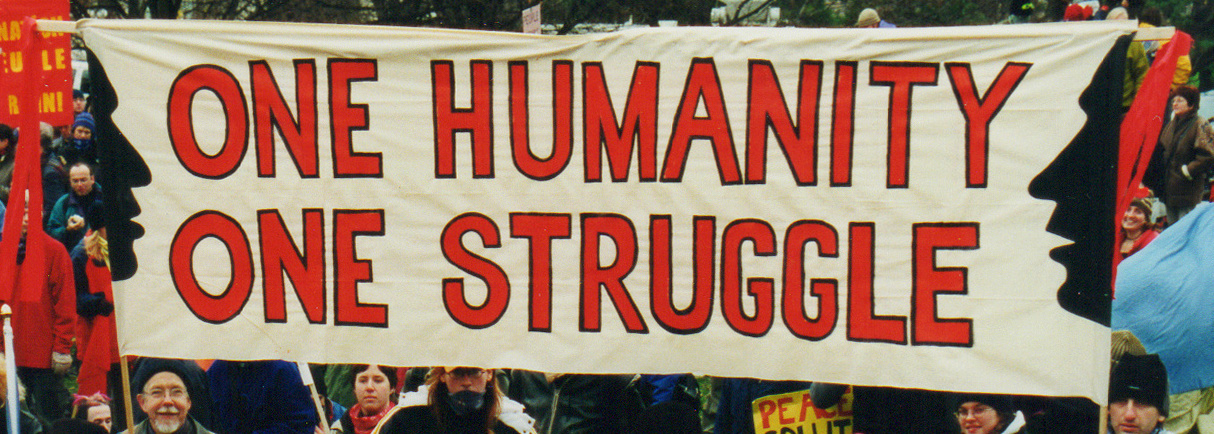
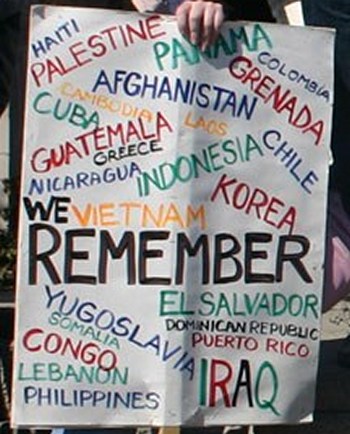 September 11 also
marks the day in 1973 when the U.S. staged a coup d'état in
Chile that overthrew the democratically elected government of President
Salvador Allende and installed the brutal dictatorship of Augusto
Pinochet which committed untold crimes against the Chilean people. This
was the opening shot of sustained state-terror against the peoples of
Argentina and South America through the CIA's
September 11 also
marks the day in 1973 when the U.S. staged a coup d'état in
Chile that overthrew the democratically elected government of President
Salvador Allende and installed the brutal dictatorship of Augusto
Pinochet which committed untold crimes against the Chilean people. This
was the opening shot of sustained state-terror against the peoples of
Argentina and South America through the CIA's 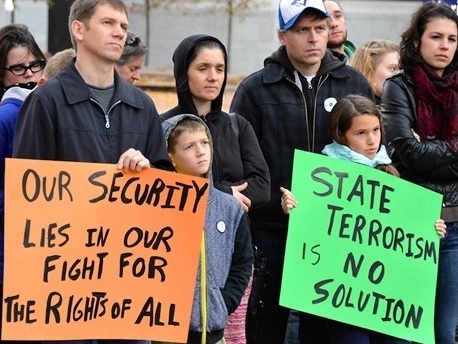 Furthermore, in
the name of preserving liberal democratic institutions, such
governments justify the increasing use of the police powers that
underlie the constitutions of what are called the western democracies.
Those constitutions permit the imposition of what is called the rule of
law in the service of private, foreign and supranational interests, not
the interests of the people. Such a "rule of law" is in contempt of a
modern conception of law that serves the cause of justice by defending
the people's rights and interests, and punishes those who violate the
people's rights or otherwise cause harm to their well-being. The rule
of law and police powers based on those western constitutions are out
of sync with the needs of the times because their raison
d'état is to keep the people out of power so that
the rulers can act with impunity.
Furthermore, in
the name of preserving liberal democratic institutions, such
governments justify the increasing use of the police powers that
underlie the constitutions of what are called the western democracies.
Those constitutions permit the imposition of what is called the rule of
law in the service of private, foreign and supranational interests, not
the interests of the people. Such a "rule of law" is in contempt of a
modern conception of law that serves the cause of justice by defending
the people's rights and interests, and punishes those who violate the
people's rights or otherwise cause harm to their well-being. The rule
of law and police powers based on those western constitutions are out
of sync with the needs of the times because their raison
d'état is to keep the people out of power so that
the rulers can act with impunity.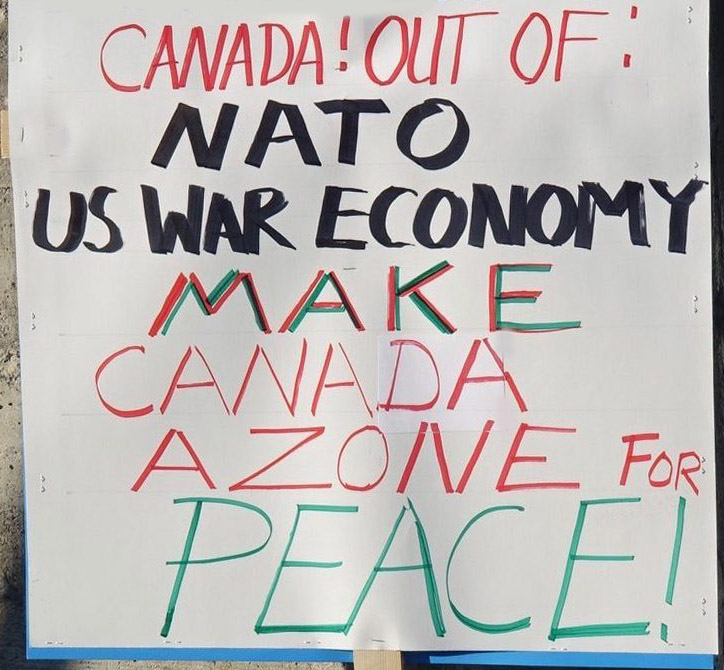 Despite what the
U.S. imperialists and their appeasers may say, what followed the events
of September 11, 2001 was the beginning of a new round of state
terrorism, anarchy and violence, as was September 11, 1973 for the
peoples of Chile and elsewhere in South and Central America and the
Caribbean. So too the 20th anniversary of 9/11 is the beginning of yet
another round of the same, as the unfolding events in Afghanistan are
showing.
Despite what the
U.S. imperialists and their appeasers may say, what followed the events
of September 11, 2001 was the beginning of a new round of state
terrorism, anarchy and violence, as was September 11, 1973 for the
peoples of Chile and elsewhere in South and Central America and the
Caribbean. So too the 20th anniversary of 9/11 is the beginning of yet
another round of the same, as the unfolding events in Afghanistan are
showing.
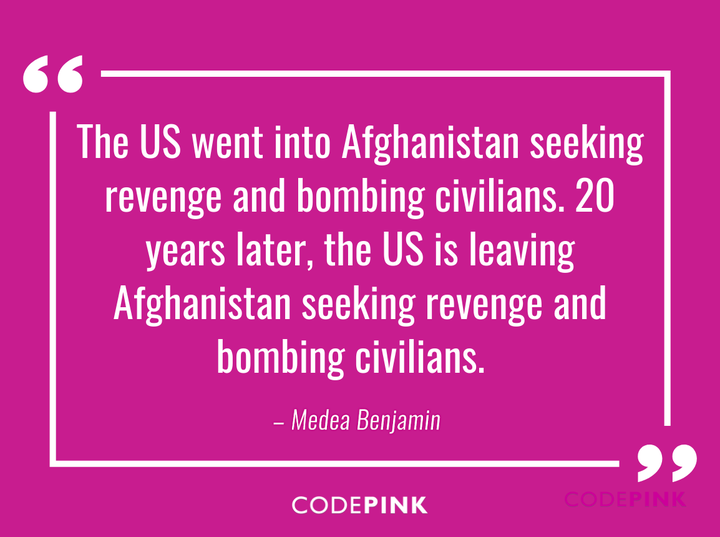 Far from
reflecting on anything, faced with the loss of U.S. credibility
following its humiliating defeat in Afghanistan, President Joe Biden
attempted once again to unite the military bureaucracy at home and its
allies in NATO under the U.S. baton. The U.S. military bureaucracy is
deeply divided as is NATO over how the U.S. can achieve "indispensable
nation" status and authority in the world. In this they do not have the
support of the peoples of the U.S. itself or the world at a time the
call of history is beckoning the peoples to achieve their striving for
peace, freedom and a democracy which serves them. The concerns of the
U.S. President are not for peace, however. He expressed them clearly in
his post-Afghanistan war press conference on August 31.
Far from
reflecting on anything, faced with the loss of U.S. credibility
following its humiliating defeat in Afghanistan, President Joe Biden
attempted once again to unite the military bureaucracy at home and its
allies in NATO under the U.S. baton. The U.S. military bureaucracy is
deeply divided as is NATO over how the U.S. can achieve "indispensable
nation" status and authority in the world. In this they do not have the
support of the peoples of the U.S. itself or the world at a time the
call of history is beckoning the peoples to achieve their striving for
peace, freedom and a democracy which serves them. The concerns of the
U.S. President are not for peace, however. He expressed them clearly in
his post-Afghanistan war press conference on August 31. As the last U.S.
troops pulled out of the Kabul airport, Taliban soldiers took a
symbolic walk on the runway to mark the routing of yet another empire
from Afghanistan. With this, the people of Afghanistan have entered
another stage of their struggle for independence, peace, freedom,
dignity, justice and equality. The people of Afghanistan will bring
their valour, patience, wisdom and striving to be into play once again,
to build a new Afghanistan in which the rights of all are affirmed.
As the last U.S.
troops pulled out of the Kabul airport, Taliban soldiers took a
symbolic walk on the runway to mark the routing of yet another empire
from Afghanistan. With this, the people of Afghanistan have entered
another stage of their struggle for independence, peace, freedom,
dignity, justice and equality. The people of Afghanistan will bring
their valour, patience, wisdom and striving to be into play once again,
to build a new Afghanistan in which the rights of all are affirmed. After the world witnessed the
U.S. defeat in Afghanistan on live media feeds, every effort was made
by elected officials and the media, to direct all attention to the
alleged "moral obligation" of the U.S. to rescue its collaborators in
Afghanistan. It has been done to divert attention from the need to hold
the U.S. to account for the crime of illegal aggressive war and
collective punishment of the people of Afghanistan. The same can be
said of Canada, which too needs to be held to account but where the
issue has also been made that of its moral duty to rescue collaborators.
After the world witnessed the
U.S. defeat in Afghanistan on live media feeds, every effort was made
by elected officials and the media, to direct all attention to the
alleged "moral obligation" of the U.S. to rescue its collaborators in
Afghanistan. It has been done to divert attention from the need to hold
the U.S. to account for the crime of illegal aggressive war and
collective punishment of the people of Afghanistan. The same can be
said of Canada, which too needs to be held to account but where the
issue has also been made that of its moral duty to rescue collaborators.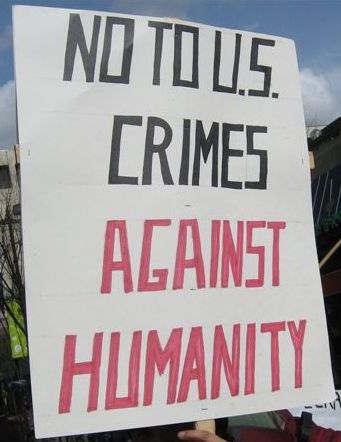 The humiliation
of the U.S. military is such that top officials from the Army, Navy,
Air Force and Marines all sent letters to their forces saying that U.S.
forces did not die in vain. Chairman of the Joint Chiefs of Staff
General Mark Milley asserted: "One thing I am certain of: For any
soldier, sailor, airman, or Marine and their family, your service
mattered, and it was not in vain." Even Biden admitted: "We no longer
had a clear purpose in an open-ended mission in Afghanistan. After 20
years of war in Afghanistan, I refused to send another generation of
America's sons and daughters to fight a war that should have ended long
ago."
The humiliation
of the U.S. military is such that top officials from the Army, Navy,
Air Force and Marines all sent letters to their forces saying that U.S.
forces did not die in vain. Chairman of the Joint Chiefs of Staff
General Mark Milley asserted: "One thing I am certain of: For any
soldier, sailor, airman, or Marine and their family, your service
mattered, and it was not in vain." Even Biden admitted: "We no longer
had a clear purpose in an open-ended mission in Afghanistan. After 20
years of war in Afghanistan, I refused to send another generation of
America's sons and daughters to fight a war that should have ended long
ago."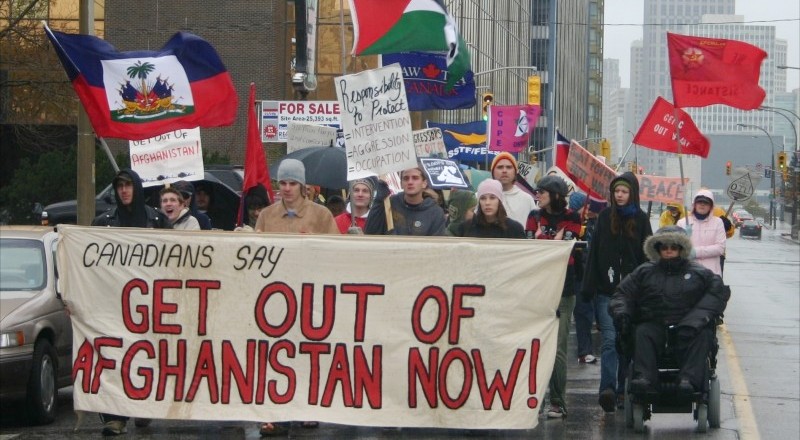
 Canada like other
NATO members was dragged into the U.S. "war on terror" in Afghanistan
based on the lie that the U.S. was acting in self-defence. NATO's
Atlantic Council asserted, without evidence, one day after the
terrorist attack on the Twin Towers and the Pentagon that the
Taliban-led government of Afghanistan was responsible and had to be
taken out by force. NATO's Article 5, which states that an attack on
any of its members is an attack on all of them that requires collective
defence, was quickly invoked to get other members of the alliance to
join the U.S. intervention in Afghanistan. The same false claim of
self-defence was used to get the UN Security Council to go along with
NATO's violation of the Charter of the United Nations, which the
Security Council is duty-bound to uphold, regarding what does and does
not constitute self-defence.
Canada like other
NATO members was dragged into the U.S. "war on terror" in Afghanistan
based on the lie that the U.S. was acting in self-defence. NATO's
Atlantic Council asserted, without evidence, one day after the
terrorist attack on the Twin Towers and the Pentagon that the
Taliban-led government of Afghanistan was responsible and had to be
taken out by force. NATO's Article 5, which states that an attack on
any of its members is an attack on all of them that requires collective
defence, was quickly invoked to get other members of the alliance to
join the U.S. intervention in Afghanistan. The same false claim of
self-defence was used to get the UN Security Council to go along with
NATO's violation of the Charter of the United Nations, which the
Security Council is duty-bound to uphold, regarding what does and does
not constitute self-defence.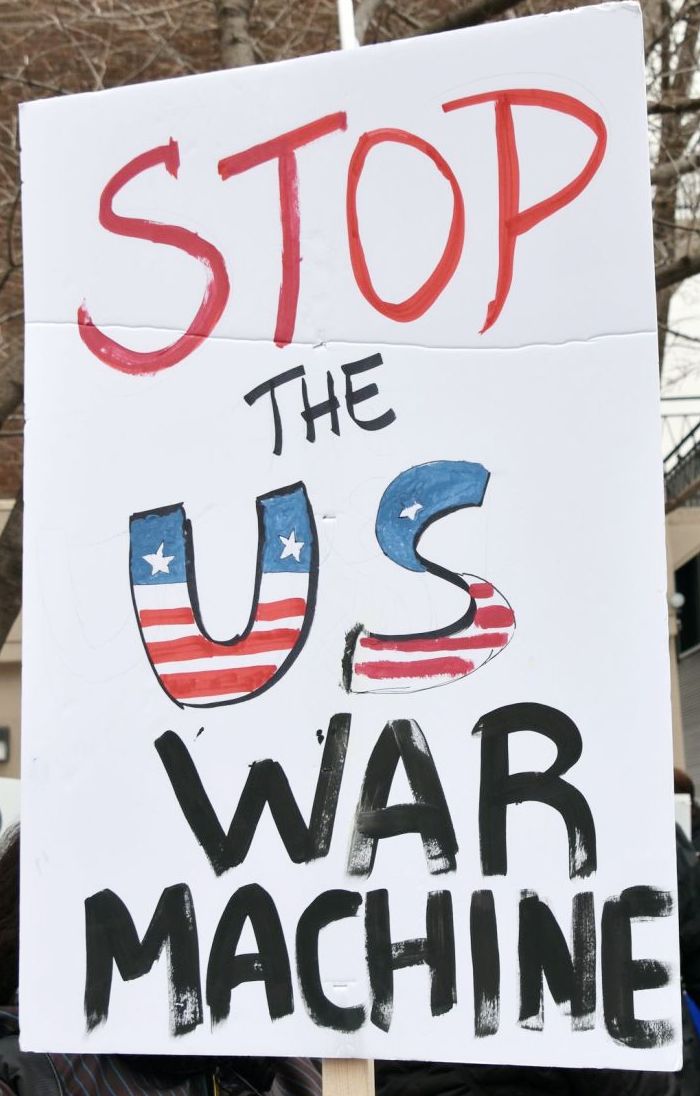 Let the
experience of Afghanistan serve as a lesson about the folly of magical
thinking that Canada "benefits" from being an integrated part of the
U.S. war machine. How are Canadians served by having their governments
interfere in the affairs of sovereign peoples around the world, as it
engages in coercive measures of all types aimed at forcing regime
change in those countries? How do Canadians benefit from military
interventions against those targeted at any given time as enemies of
the U.S. and the "free world" it claims to lead?
Let the
experience of Afghanistan serve as a lesson about the folly of magical
thinking that Canada "benefits" from being an integrated part of the
U.S. war machine. How are Canadians served by having their governments
interfere in the affairs of sovereign peoples around the world, as it
engages in coercive measures of all types aimed at forcing regime
change in those countries? How do Canadians benefit from military
interventions against those targeted at any given time as enemies of
the U.S. and the "free world" it claims to lead?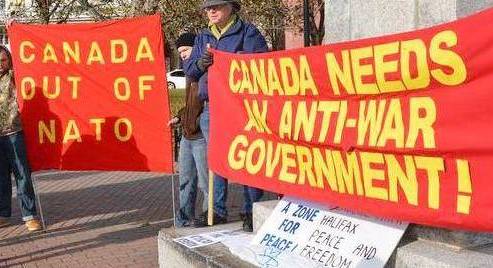 The time is now
to step up the work to demand Canada get out of NATO and the U.S. war
machine so that instead of interfering in the affairs of sovereign
countries and peoples it can become a genuine factor for peace. What
better time than during a federal election, and in view of the events
in Afghanistan, for Canadians to discuss the need for a new direction
for Canada's foreign policy and for a government that renounces war and
aggression as tools of its foreign policy, and how such a government
can be brought into being.
The time is now
to step up the work to demand Canada get out of NATO and the U.S. war
machine so that instead of interfering in the affairs of sovereign
countries and peoples it can become a genuine factor for peace. What
better time than during a federal election, and in view of the events
in Afghanistan, for Canadians to discuss the need for a new direction
for Canada's foreign policy and for a government that renounces war and
aggression as tools of its foreign policy, and how such a government
can be brought into being. His belief that
this hides the reality is misguided indeed. The peoples of the entire
world observed what took place, including the failure of his
"intelligence professionals" to predict the Taliban takeover and the
speed with which it took place. They also witnessed the U.S. agent
placed in the presidency of Afghanistan flee the country with bags of
money stuffed into helicopters as he ran away. Perhaps he will say he
did it to champion the cause of women and girls. The truth of the
matter is that after 20 years of justifying all U.S. crimes in the name
of establishing rule of law and championing the rights of women and
girls, there is nothing to show for it except a devastated country
which Biden continues to threaten saying U.S. aggression will continue,
including through illegal drone warfare and assassinations decided by
the president.
His belief that
this hides the reality is misguided indeed. The peoples of the entire
world observed what took place, including the failure of his
"intelligence professionals" to predict the Taliban takeover and the
speed with which it took place. They also witnessed the U.S. agent
placed in the presidency of Afghanistan flee the country with bags of
money stuffed into helicopters as he ran away. Perhaps he will say he
did it to champion the cause of women and girls. The truth of the
matter is that after 20 years of justifying all U.S. crimes in the name
of establishing rule of law and championing the rights of women and
girls, there is nothing to show for it except a devastated country
which Biden continues to threaten saying U.S. aggression will continue,
including through illegal drone warfare and assassinations decided by
the president.

